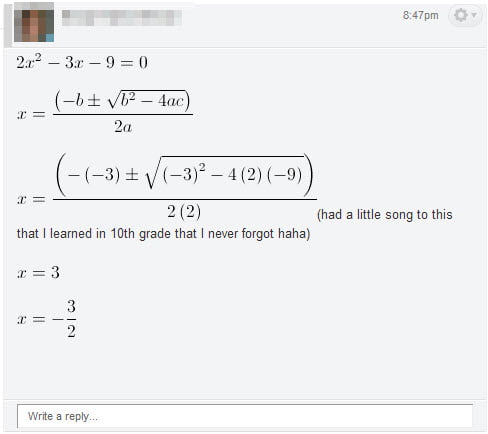I am planning to ask my fall online calculus students to create twitter accounts in order to tweet their studying in hourly increments. As you are probably aware, this is the way I’ve been holding myself accountable to working on my dissertation (227 hours and counting).
Since time management is an issue for online students, I want them to be accountable to themselves that they are honestly putting the time in. In particular, learning in math needs to be spread out over time for long-term retention, but it often gets crammed in at the last minute before a test. Also, I want to know how they are progressing and what their frustration level is with the material.
Logistics: The students do not have to put any identifying information on the accounts as long as I have the “handle” they have chosen on twitter. They will be required to put a hashtag and the hour number on each study tweet (see example below) so that we can easily see the studying habits of the whole class on one page. There will be a minimum tweet requirement of 8-12 hours of studying a week (4-credit course) for a total of 150 hours by the end of the semester. I suspect that it will become a bit of a contest to see who can study the most in the semester (but I may live in a world of rainbows and unicorns).
Why not just ask students to make a written log of their study time? Twitter provides a time stamp, which makes it a little harder to “throw together” a study log during the 10 minutes before it is due.
Why twitter and not something like a discussion board? The ease of posting from either a cell phone or any computer with Internet with minimal log-in (since you can have your twitter login “remembered” on your home computer or use a twitter application, this makes it much easier that logging in to our LMS). Also, the brevity of the tweets are nice. While I encourage writing about math, I do not need to read 150 paragraphs x 20 students worth of study habits. 150 sentences x 20 students will be plenty (and using twitter will ensure that it will be kept to a manageable level).
What if they want to share a math problem they are having trouble with? Have you heard of Jing?
How will I keep track of them all? Students will have to add a chosen hashtag (#m161f09 comes to mind) to each tweet so that we can all see all the study tweets on one page. They will be free to follow each other, but they don’t have to. Our LMS does not have a feature where you can see who else is online with you, so this will provide a little bit of feedback about who is studying when.
Good tweets / Bad tweets:
Good: #m161f09 (hr 103): Worked on the first two parts of the chain rule homework set, but I’m just not seeing how I choose the u-substitution, or really why I do it.
Bad: #m161f09 (hr 103): Studied for one hour.
Training: Yes, I am going to need to teach them some twitter etiquette (e.g. tweeting is not IMing), and I haven’t done that yet, but when I make that video for students I will post it around here somewhere, never fear. 🙂
Couldn’t students cheat? Sure, but they will have to remember to log 150 time-stamped hours spread over 15 weeks at a rate of at least 8 per week and it will have to correspond with the material that is being covered and their actual login hours in the LMS. I think it would be easier just to report what they are doing as they do it.
There are some other benefits to twitter that I am hoping to see: I want students to “plug in” to the network of other students while they study. They do this with the discussion forums, but only when they need help. However, they might find that other students in the course struggle with similar concepts without explicitly asking for help on a discussion board. I am hoping this fosters more collaboration and a sense of “classroom community” that we still struggle with in online math. Personally, I’ve struggled with ways to add more sense of community to my online classes in a way that is similar to student interaction that is face-to-face. I think this could do it.
Another benefit I’m hoping to see is more students watching the videos before they do the homework. I know they are well-watched in the process of homework completion, but there are some video lessons about foundational concepts that probably get light student coverage for lack of directly corresponding homework. Perhaps when faced with an hourly requirement as well as an assignment completion requirement, this will make it more likely that the videos get watched before the struggles begin to complete problems.
I am also hoping that students begin to see the value of a learning network (as opposed to just a social network) and learn a method of accountability that can help them when they take on large projects (whether it is in school or for work). In this “age of distraction” that we live in, it is important that we teach our students how to focus when they need to (and learn how to do this ourselves).
Of course, I have to wait until the fall semester to try it myself, but if you give it a try before then, let me know how it goes! For now, I’m back to work on that pesky dissertation (and hour 228). You can follow me toiling away @busynessgirl if you’d like.
UPDATE: After thinking about this quite a bit, I am making one tweak. I don’t want the need to count the hours to make this just another bad educational metric. Therefore, although I will ask students to tally the hours, I will not require any specific amount – just a guideline that 8-12 hours per week would be what I would consider necessary to pass a 4-credit online calculus course. I will prod students with low study times and low grades to try to put more time in, but I will hope that the social nature of the interactions will simply drive students to work hard. At the end of the semester, I will ask students to write a 1-page summary of the experience and what they learned about their study habits.



